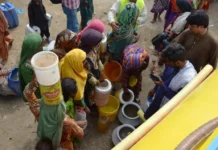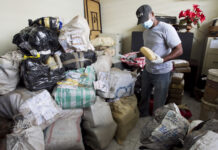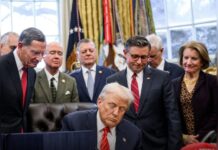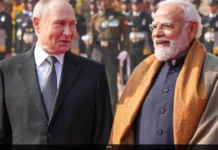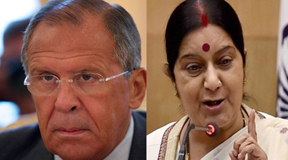 DUSHANBE, Tajikistan: India and Russia today reviewed entire gamut of their bilateral relationship including cooperation in crucial sectors of defense, energy security, trade and investment and agreed to inject fresh vigor in the strategic and time-tested ties.
DUSHANBE, Tajikistan: India and Russia today reviewed entire gamut of their bilateral relationship including cooperation in crucial sectors of defense, energy security, trade and investment and agreed to inject fresh vigor in the strategic and time-tested ties.
In a meeting on the sidelines of annual summit of SCO, External Affairs Minister Sushma Swaraj and her Russian counterpart Sergei Lavrov also extensively deliberated on situation in Ukraine, Iraq and Afghanistan as well as Russian President Vladimir Putin’s visit to New Delhi later this year.
Issues relating to economic cooperation and energy security besides implementation of various joint projects were deliberated upon thoroughly by Swaraj and Lavrov who hoped that under the new government in India, the relationship will grow further.
Both the leaders felt that there was scope for expansion of ties between the two countries in a range of areas including trade, investment, energy and defense.
Russia may like to go for further deepening of ties with countries like India and China following sanctions against it for supporting the separatists in Ukraine.
President Barack Obama had yesterday said the US and the European Union have decided to “intensify” their coordinated sanctions on Russia in the defense, finance and energy sectors as punishment for its “illegal actions” in Ukraine.
“Entire gamut of bilateral issues were discussed in the meeting. Situations in Iraq, Afghanistan and Ukraine were also deliberated upon by the two leaders,” the sources said.
Swaraj and Lavrov discussed about preparations for the annual Summit between Prime Minister Narendra Modi and President Putin scheduled during the course of the year in which both the sides are likely to announce decisions to broaden the strategic partnership.
Relations with Russia are a key pillar of India’s foreign policy. Annual Summit meeting between the Prime Minister of India and the Russian President is the highest institutionalized dialogue mechanism under the Strategic Partnership between the two countries.
So far 14th Annual Summit meetings have taken place alternatively in India and Russia. The last Summit was held in Moscow on 21 October 2013 when then Prime Minister Manmohan Singh visited the city. . India has longstanding and wide-ranging cooperation with Russia in the field of defense. India-Russia military technical cooperation has evolved from a simple buyer seller framework to one involving joint research, development and production of advanced defense technologies and systems.
The two leaders also discussed about the situation in Afghanistan as NATO troops are leaving the troubled country by end of the year.
Russia has been helping India in its quest for nuclear energy and has in-principle agreed to the Indian nuclear liability law, paving the way for signing a contract for unit 3 and 4 of the Kudankulam Nuclear Power Plant (KNPP).
Two units of KNPP have been set up by Russia in Tamil Nadu and the first unit has already been made operational.
India and Russia signed a general framework agreement on unit 3 and 4 in April this year after crossing the initial hurdles of the Civil Liability Nuclear Damage Act 2010.
After election results were out, Putin had congratulated Modi for BJP’s “convincing victory” and hoped that both the countries will be able to achieve greater success and further bolster the relationship.
Modi and Putin had met on the sidelines of the sixth summit of BRICS (Brazil, Russia, India, China, and South Africa) that was held in Brazilian cities of Fortaleza and Brasilia on July 15-16.
Trade, investment and economic cooperation between India and Russia has been growing steadily.
In 2012, bilateral trade increased by 24.5 per cent to reach USD 11 billion out of which Indian exports amounted to USD 3 billion while Russian exports were valued at USD 8 billion.
In January-September 2013, bilateral trade amounted to USD 6.94 billion. Exports from India to Russia amounted to USD 2.33 billion while imports from Russia stood at USD 4.61 billion. The two-way investment between the two countries stands at approximately USD 8 billion.
In 2009, both sides set the target of USD 20 billion bilateral trade by 2015. Priority areas for expanding bilateral economic cooperation are pharmaceuticals, IT, steel, diamonds, aviation, fertilizers, infrastructure, heavy engineering and food products.–PTI

